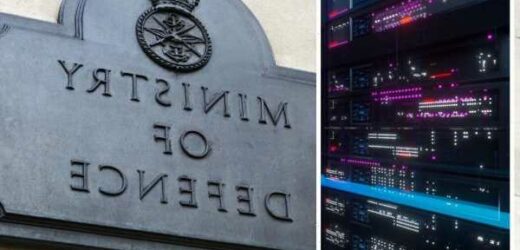Putin threatening ‘high-risk cyber attacks’ says expert
We use your sign-up to provide content in ways you’ve consented to and to improve our understanding of you. This may include adverts from us and 3rd parties based on our understanding. You can unsubscribe at any time. More info
The MoD has purchased its first quantum computer, a system capable of making complex calculations in super-fast time, which creators claim will solve problems regular machines are not capable of. The computer will assist the ministry in optimising its capability to run simulations and analyse data in order to better evaluate its position. MoD officials will work with British company Orca Computing to examine how the system can benefit the defence sector.
Stephen Till, of the MoD’s Defence Science and Technology Laboratory (DSTL), called it a “milestone moment”.
Many home-based computers process data in bits, using binary code with a value of one or zero.
However, the more powerful quantum machines use a two-stage unit called a qubit.
The process allows the computer to represent one or zero in unison through a quantum mechanical process called superposition.
The process lets quantum computers bridge binary digits and cope with uncertainty where regular computers cannot.
Read more stories like this by following Defence and Security Correspondent James Lee on Twitter – Just Click the handle: @JamesLee_DE


Experts suggest complex problems on regular computers could take years to solve, however, the new technology could see the same issues resolved in minutes.
A number of countries, including the US, China, Russia and the UK, are working hard and investing huge sums of money to develop these super-fast quantum computers, sparking concerns of a “data apocalypse” in the future.
Ilyas Khan, chief executive of the Cambridge and Colorado-based company Quantinuum, previously explained: “Quantum computers will render useless most existing methods of encryption.”
“They are a threat to our way of life.”


But Prof Winfried Hensinger, head of the Sussex Centre for Quantum Technologies at the University of Sussex, says the true potential of quantum computers will take time to fully materialise.
He said: “They can’t actually solve any practical problems yet.
“They’re enabling you to maybe gauge the possibilities of what working on a quantum computer would have if you can scale this machine to really large system sizes.”
He adds the promise of quantum computing, and the MoD’s exploration of it, is still significant.
The professor continued: “Quantum computing can be disruptive in nearly any industry sector.
“You can imagine that within defence, there’s a lot of problems where optimisation can play a huge and very important role.”
DON’T MISS:
‘Profound concerns’ as Putin backs Iran in nuclear talks [REPORT]
NATO sends 3,000 troops to Russian border in show of force [REVEAL]
Have some of that! UK missiles force Russia to retreat 100km [INSIGHT]

Richard Murray, chief executive of Orca Computing, says despite the debate over the realities and capabilities of quantum computing, the company’s work with the MoD is a “significant vote of confidence”.
“Our partnership with MoD gives us the type of hands-on close interaction, working with real hardware which will help us to jointly discover new applications of this revolutionary new technology.”
The Ministry will work with a special version of the computer capable of working at room temperature, unlike many others requiring sub-zero environments to run smoothly.
Orca’s system uses photons, or single units of light, to optimise machine learning tasks like image analysis and decision-making.
Read more stories like this by following Defence and Security Correspondent James Lee on Twitter – Just Click the handle: @JamesLee_DE

Mr Till says having access to Orca’s quantum computer will accelerate the MoD’s understanding of the technology.
He ended: “We expect the Orca system to provide significantly improved latency – the speed at which we can read and write to the quantum computer.”
As security moves into the realm of cyber and counter-cyber realms, the notion of a super-computer could prove vital in global defences.
Furthermore, the ability to run multiple scenarios quickly will provide analysts and experts with real-time information and data allowing tactical and decision making to become more evidence-based.
Source: Read Full Article


